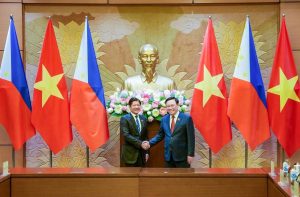Vietnam and the Philippines have agreed to boost cooperation between their coast guards and work to prevent incidents in disputed parts of the South China Sea, against a backdrop of growing Chinese assertiveness.
The two countries, which have overlapping maritime claims in the sea, signed the two memoranda of understanding on the second day of Philippine President Ferdinand Marcos Jr.’s state visit to Vietnam.
In remarks delivered prior to a meeting with President Vo Van Thuong yesterday, Marcos described Vietnam as “the sole strategic partner of the Philippines” in Southeast Asia and that “maritime cooperation is the foundation” of the strategic partnership established by Hanoi and Manila in 2015.
The two agreements covered “maritime cooperation” between the two nations’ coast guards and “incident prevention in the South China Sea,” Reuters reported, citing a Vietnamese official who announced the deals during a formal ceremony in the Presidential Palace in Hanoi.
A statement from Marcos’ office said that under the deal on incident prevention, Vietnam and the Philippines agreed to enhance coordination on maritime issues bilaterally, within the Association of Southeast Asian Nations (ASEAN), and with other dialogue partners. The maritime cooperation deal aims to establish a comprehensive partnership between the two coast guards, which would cover capacity building, training, and personnel and ship exchanges. According to earlier reports, the two nations are also thinking of establishing a hotline to improve coordination between their coast guards.
The past year has been a turbulent one in the South China Sea, with China intensifying its pressure campaign against the Philippines, with Second Thomas Shoal, a submerged feature in the Spratly Islands, emerging as a particular focus of friction. The Philippines currently occupies the shoal, where it has grounded an old warship, the BRP Sierra Madre, but China has made more and more forceful attempts to prevent the resupply of the Philippine forces stationed in the ship. This has resulted in a number of dangerous encounters between Chinese and Philippine vessels, raising fears of a wider conflict.
Data analysis released this week by the Center of Strategic and International Studies confirmed that the number of Chinese vessels at Second Thomas Shoal has increased “dramatically” in the past year, while also involving more military and paramilitary vessels. There have also been recent tensions between China and Vietnam in the South China Sea, though on a smaller scale, presumably because Beijing views the increasingly U.S.-aligned Philippines as a more inviting target.
During his meeting with Thuong, Marcos underlined that the South China Sea remained “a point of contention” for the Philippines, according to a statement from his office. “We are firm in defending our sovereignty, sovereign rights, and jurisdiction against any provocations. But at the same time, we are also seeking to address these issues with China through peaceful dialogue and consultations as two equal sovereign states.”
In a meeting with Vietnamese Prime Minister Pham Minh Chinh, the latter said that “the world and regional situation is evolving in a rapid and complicated manner and therefore we need to unite and cooperate more closely.”
The agreements mark a welcome step forward in cooperation between the two nations. In the past, unresolved maritime disputes between the Southeast Asian claimant states – Vietnam, the Philippines, Malaysia, and Brunei – have prevented these nations from forming a common stance regarding China’s maximalist claims, which affect all of them.
That said, while these agreements indicate the shared interests between the Philippines and Vietnam in managing the disputes in the South China Sea, they do not mark a full strategic alignment. For a number of reasons, mostly to do with its awkward geographic, political, and historic proximity to China, Hanoi is unlikely to follow Manila’s increasingly robust and defiant stance against recent Chinese incursions, which has been based on the revival of a close security alliance with the United States.
Instead, Vietnam will incorporate closer bilateral cooperation on maritime security within the broader scope of its foreign policy approach, which seeks to cushion the impact of China’s proximity to “omnidirectional” engagement with a diversified suite of regional partners.

































